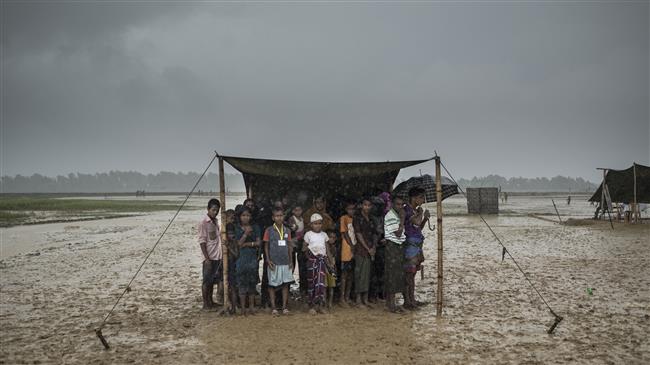
RNA - Local Bangladeshi police chief Abdul Khaer said that the young child was crushed in his sleep early Monday when a mud wall collapsed onto his family's shanty in Kutupalong refugee settlement.
"It was triggered by rain over the last three days," media outlets quoted Khaer as saying.
The child is the first casualty of the monsoon as wild storms wreak havoc in the crowded camps in Bangladesh's southeast.
Kutupalong camp magistrate Rezaul Karim said about 300 shelters had been damaged since the first downpours of the rainy season began in earnest Saturday. "We relocated 20 families last night."
Aid agencies have been warning that the monsoon could unleash "an emergency within an emergency" for the close to one million Rohingya living in temporary shelters in southeast Bangladesh.
UN refugee agency spokeswoman Caroline Gluck on Sunday painted a bleak picture of the area in rainy season.
"Some areas, like the football field areas, are flooded. Some houses have been inundated with water. There have been a few landslides. The conditions are bad," Gluck said.
The monsoon season "is going to be big test for everybody involved in the humanitarian response," she added.
Bangladesh's meteorological office said that the district where refugees perch on steep hillsides in bamboo and plastic tents was hammered by 138 millimeters of rain between Saturday night and midday Sunday.
The area is forecast to receive 2.5 meters of rainfall during this year's monsoon.
There are fears flooding could cause latrines to overflow and spread disease in the camps.
Aid agencies working in the camps say an estimated 200,000 refugees are at direct risk of floods and landslides and need relocating.
Kevin J. Allen, head of the United Nations refuge agency’s operations in Bangladesh’s Cox's Bazar, posted on Twitter on Sunday that nearly 29,000 had been moved to new locations, but "more evacuation space is urgently needed to save lives."
Monsoon rains wreak havoc every year in Cox’s Bazar and the adjacent Chittagong Hill Tracts, a tropical forest zone home to wild elephants. Last season, heavy rain triggered landslides in the tract region, killing 170 people.
More than 100 died in landslides in the region in 2012, and two years earlier around 50 perished.
In recent months, aid groups have repeatedly warned that the looming monsoon season is predicted to pose the most serious threat to the lives of refugees.
More than 700,000 members of the Rohingya minority have fled the state-sponsored violence from Myanmar to Bangladesh over the past nine months. Thousands were killed and hundreds of thousands were uprooted in the campaign.
Myanmar’s government troops have been committing killings, making arbitrary arrests, and carrying out arson attacks in Muslim villages in Rakhine state over the past months.
The Rohingya have lived in Myanmar for generations but are denied citizenship and are branded illegal immigrants from Bangladesh, which likewise denies them citizenship.
The UN has also described the 1.1-million-strong Muslim community as the most persecuted minority in the world.
847/940